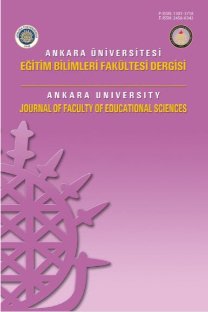The instrument for determining the views of primary school students about historical knowledge
İlköğretim öğrencilerinin tarihsel bilgiye yönelik görüşlerini belirleme ölçeği
___
- Barton, K. C. (1996). Narrative simplifications in elementary students' historical thinking. In Brophy, J (Eds.). Advances in research on teaching,: Teaching and learning in history, (pp.51-84).Greenwich, CN: JAI Press.
- Breisach, E. (2009). Tarihyazımı. (Çev:H. Kocaoluk).İstanbul: Yapı Kredi Yayınları.
- Büyüköztürk, Ş. (2003). Veri Analizi El Kitabı. 2. Baskı. Ankara: Pegem/A Yayıncılık.
- Carr, E. H. (1996). Tarih Nedir?. (Çev: M.G.Göktürk). İstanbul: İletişim Yayınları.
- Cevizci, A. (1997). Felsefe Sözlüğü. Ankara: Ekin Yayınları.
- Coakes, S. J. (2005). SPSS: Analysis without anguish: Version 12.0 for Windows. Melbourne: John Wiley and Sons.
- Çulha, B. (2006). “Tarihsel Mekânlarda Sosyal Bilgiler Öğretimine Yönelik Öğrenci Görüşleri”. Yayınlanmamış yüksek lisans tezi. Dokuz Eylül Üniversitesi Eğitim Bilimleri Enstitüsü, Ankara.
- Dilek, D. (2002). Tarih Derslerinde Öğrenme ve Düşünce Gelişimi, Ankara: Pegem/A Yayıncılık
- Dilek, D. (2009). Geçmişi İmgelerle Yeniden Kurmak: İlköğretim Düzeyinde Tarihsel İmgelem Becerilerinin Kullanımı Üzerine İkonografik Bir Analiz. Kuram ve Uygulamada Eğitim Bilimleri, 9 (2) Bahar 2009, 633-689.
- Erkuş, A. (2003). Psikometri Üzerine Yazılar. Ankara:Türk Psikologlar Derneği Yayınları.
- Foster, S. J. & E. A. Yeager, (1999). “You’ve got put together the pieces”: English 12 years olds encounter and learn from historical evidence. Journal of Curriculum and Supervision. 14 (4), 286-298.
- Jenkins, K. (1997) Tarihi Yeniden Düşünmek. (Çev: B. Şener). Ankara: Dost Kitabevi Yayınları.
- Kuhn, D., Weinstock, M. (2002). What is epistemological thinking and does it matter?. B. K. Hofer & P.R. Pintrich (Eds.) Personal epistemology: The psychology of beliefs about knowledge and knowing (pp. 121-144) Mahwah, NJ: Lawrence Erlbaum Associates.
- Lee, P., Shemilt, D. (2003). A scaffold, not a cage: Progression and progression models in history. Teaching History, 113, 13-24.
- Lee, P., Ashby, R. (2000). Progression in historical understanding among students ages 7-14 In P. N. Stearns, P. Seixas., S. Wineburg (Eds.). Knowing, Teaching and Learning History: National and International Perspectives (pp.199-222). New York: New York University Press.
- Lee, P. J. (2004). Understanding History. In P. Seixas (Eds). Theorizing Historical Consciousness (pp.129-164). Toronto: University of Toronto Press.
- Levstik, L. S., Barton, K. C. (2001). Doing History: Investigating with Children in Elementary and Middle School. New York: Routledge Press.
- Noar, S. M. (2003). The role of structural equation modeling in scale development. Structural Equation Modeling: A Multidisciplinary Journal, 10(4), 622-647.
- Özbaran, S. (1992). Tarih ve Öğretimi. İstanbul: Cem Yayınevi.
- Özlem, D. (2005). Tarih Felsefesi. İzmir: Dokuz Eylül Üniversitesi Yayınları.
- Safran, M. (2008). Türkiye’de Tarih Eğitimi ve Öğretimi. M. Safran, D. Dilek (Ed). 21. Yüzyılda Kimlik, Vatandaşlık ve Tarih (ss.7-13). İstanbul: Yeni İnsan Yayınevi.
- Schommer, M. (1990). Effect of beliefs about the nature of knowledge on comprehension. Journal of Educational Psychology, 82, 498-504.
- Şencan, H. (2005). Sosyal ve Davranışsal Ölçümlerde Güvenilirlik ve Geçerlilik. Ankara: Seçkin Yayınları.
- Şimşek, Ö. F. (2007). Yapısal Eşitlik Modellemesine Giriş: Temel İlkeler ve LISREL Uygulamaları. Ankara: Ekinoks Yayıncılık.
- Tavşancıl, E. (2002). Tutumların Ölçülmesi ve SPSS ile Veri Analizi. Ankara: Nobel Yayınevi.
- Tosh, J. (2005). Tarihin Peşinde. (Çev: Ö. Arıkan), İstanbul: Tarih Vakfı Yurt Yayınları.
- VanSledright, B. (2002). In search of america’s past. Learning to read history in elementary school: New York: Teacher College Press.
- Wineburg, S. (1991). Historical problem solving: A study of the cognitive processes used in the evaluation of documentary and pictorial evidence: Journal of educational Psychology, 83, 73-87.
- Wineburg, S. (2001). Historical thinking and other unnatural acts. Charting the future of teaching the past. Philadelphia: Temple University Press.
- Worthington, R. L ve Whittaker, T.A. (2006). Scale development research: A content analysis and recommendations for be”st practives. The Counseling Psychologist, 34, 806-838.
- Yapıcı, G. (2006). “Dört Kültürde Tarih Öğretimi Yaklaşımı: İngiltere, Fransa, İsviçre ve Türkiye Örnekleri”, Yayınlanmamış yüksek lisans tezi, Marmara Üniversitesi Eğitim Bilimleri Enstitüsü, İstanbul.
- Yeager, E., Davis, O. L. (1996) Classroom teachers thinking about historical texts. An exploratory study. Theory and Research in Social Education. 24. 144-166.
- ISSN: 1301-3718
- Yayın Aralığı: 3
- Başlangıç: 1968
- Yayıncı: ANKARA ÜNİVERSİTESİ (EĞİTİM BİLİMLERİ FAKÜLTESİ)
Kübra KABASAKAL ATALAY, Hülya KELECİOĞLU
How realistically do the elementary school students approach to non-routine word problems?
Çiğdem KILIÇ, Hatice OLKUN, Sinan OLKUN
Çiğdem KILIÇ, Sinan OLKUN, Hatice OLKUN
Problem solving applications in chemistry laboratory
An oral history try on the process of the foundation of Ankara University Faculty of Education
Ankara Üniversitesi Eğitim Fakültesi’nin Kuruluş Süreci Üzerine Bir Sözlü Tarih Denemesi
Consideration on the phenomenon of authority within the framework of constructivism
Web 2.0 online collaboration tools as environments for task-based writing instruction
